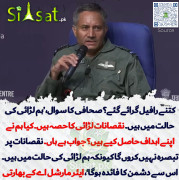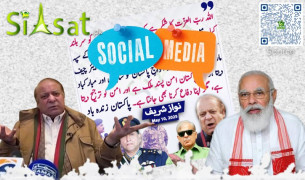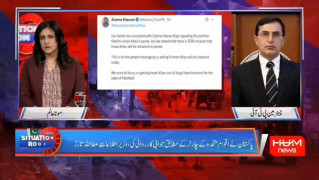You are using an out of date browser. It may not display this or other websites correctly.
You should upgrade or use an alternative browser.
You should upgrade or use an alternative browser.
History of the Quran Compilation | Was the Prophet Muhammad illiterate
- Thread starter Citizen X
- Start date
tahirmajid
Chief Minister (5k+ posts)
ye kon uloo ka patha aisi batein sochta rehta hay, khud Jibraeil (AS) ne un ko parhna likhna sikhaya tha, Hazoor (PBUH) ne jo letter likhey thay dosrey kings ko wo kaisey likhey??? jihalat ki inteha hay log sochey samjhey beghair hi likh daitey hain
Wake up Pak
(50k+ posts) بابائے فورم
I posted this article yesterday on this forum.
الَّذِينَ يَتَّبِعُونَ الرَّسُولَ النَّبِيَّ الْأُمِّيَّThose who follow the Messenger, the illiterate (ummi) prophet … (7:157 part)


Today, the primary meaning of gentile still remains as someone who is a “non-Jew” and is not a reader of the Torah or has any Jewish origins.
وَمِنْهُمْ أُمِّيُّونَ لَا يَعْلَمُونَ الْكِتَابَ إِلَّا أَمَانِيَّ وَإِنْ هُمْ إِلَّا يَظُنُّونَAnd among them (Jews) are “ummi” ones who do not know the Scripture except in wishful thinking, but they are only assuming. (2:78)
فَإِنْ حَاجُّوكَ فَقُلْ أَسْلَمْتُ وَجْهِيَ لِلَّهِ وَمَنِ اتَّبَعَنِ ۗ وَقُل لِّلَّذِينَ أُوتُوا الْكِتَابَ وَالْأُمِّيِّينَ أَأَسْلَمْتُمْ ۚ فَإِنْ أَسْلَمُوا فَقَدِ اهْتَدَوا ۖ وَّإِن تَوَلَّوْا فَإِنَّمَا عَلَيْكَ الْبَلَاغُ ۗ وَاللَّهُ بَصِيرٌ بِالْعِبَادِSo if they argue with you, say, “I have submitted myself to Allah [in Islam], and [so have] those who follow me.” And say to those who were given the Scripture and [to] the “ummi”, “Have you submitted yourselves?” And if they submit [in Islam], they are rightly guided; but if they turn away — then upon you is only the [duty of] notification. And Allah is Seeing of [His] servants. (3:20)
In the verse above, God is commanding Prophet Muhammad (pbuh) to proclaim the message to the Jews and Christians (recipients) of the previous scriptures and the ‘Ummis’. If one renders ‘Ummi’ here as ‘Illiterate’ then the verse becomes nonsensical as it appears God is asking the Prophet to proclaim the message to those of the previous scriptures and the illiterates. This rendering would unnecessarily exclude those who could read and write but would have not received the scripture.
In another example, if we try to assume “ummi” to mean “illiterate”, then the following verse would erroneously imply that God raised a messenger only amongst people who could not read and write. That obviously makes no sense at all.
هُوَ الَّذِي بَعَثَ فِي الْأُمِّيِّينَ رَسُولًا مِّنْهُمْ يَتْلُو عَلَيْهِمْ آيَاتِهِ وَيُزَكِّيهِمْ وَيُعَلِّمُهُمُ الْكِتَابَ وَالْحِكْمَةَ وَإِن كَانُوا مِن قَبْلُ لَفِي ضَلَالٍ مُّبِينٍIt is He who has sent among the “ummi” a Messenger from themselves reciting to them His verses and purifying them and teaching them the Book and wisdom — although they were before in clear error — (62:2)
In another example, if we try to assume “ummi” to mean “illiterate”, then the following verse would mean that some from the People of the Book said that they had no accountability to illiterate people. Once again, that makes no sense at all.
وَمِنْ أَهْلِ الْكِتَابِ مَنْ إِن تَأْمَنْهُ بِقِنطَارٍ يُؤَدِّهِ إِلَيْكَ وَمِنْهُم مَّنْ إِن تَأْمَنْهُ بِدِينَارٍ لَّا يُؤَدِّهِ إِلَيْكَ إِلَّا مَا دُمْتَ عَلَيْهِ قَائِمًا ۗ ذَٰلِكَ بِأَنَّهُمْ قَالُوا لَيْسَ عَلَيْنَا فِي الْأُمِّيِّينَ سَبِيلٌ وَيَقُولُونَ عَلَى اللَّهِ الْكَذِبَ وَهُمْ يَعْلَمُونَAnd among the People of the Scripture is he who, if you entrust him with a great amount [of wealth], he will return it to you. And among them is he who, if you entrust him with a [single] silver coin, he will not return it to you unless you are constantly standing over him [demanding it]. That is because they say, “There is no blame / duty / accountability upon us concerning the ‘ummi’.” And they speak untruth about Allah while they know [it]. (3:75)
وَكَذَٰلِكَ أَوْحَيْنَا إِلَيْكَ رُوحًا مِّنْ أَمْرِنَا ۚ مَا كُنتَ تَدْرِي مَا الْكِتَابُ وَلَا الْإِيمَانُ وَلَٰكِن جَعَلْنَاهُ نُورًا نَّهْدِي بِهِ مَن نَّشَاءُ مِنْ عِبَادِنَا ۚ وَإِنَّكَ لَتَهْدِي إِلَىٰ صِرَاطٍ مُّسْتَقِيمٍAnd thus We have revealed to you an inspiration of Our command. You did not know what is the Book (prior scripture) or [what is] faith, but We have made it a light by which We guide whom We will of Our servants. And indeed, [O Muhammad], you guide to a straight path — (42:52)وَمَا كُنتَ تَتْلُو مِن قَبْلِهِ مِن كِتَابٍ وَلَا تَخُطُّهُ بِيَمِينِكَ ۖ إِذًا لَّارْتَابَ الْمُبْطِلُونَAnd you did not recite before it any scripture, nor did you inscribe one with your right hand. Otherwise the falsifiers would have had [cause for] doubt. (29:48)
Note:
The reference to not being able to ‘write it with your right hand’ is not a reference to the Quran. This is clearly a reference to the previous scriptures which is deduced by context. The verse informs the reader that the Prophet Muhammad (pbuh) was neither a reader nor writer of the previous scriptures and hence had no knowledge of its contents, begging the question, so where did he get his knowledge from? This verse also suggests that, contrary to popular belief, the prophet had the ability to both read and write.
وَمَا كُنتَ تَرْجُو أَن يُلْقَىٰ إِلَيْكَ الْكِتَابُ إِلَّا رَحْمَةً مِّن رَّبِّكَ ۖ فَلَا تَكُونَنَّ ظَهِيرًا لِّلْكَافِرِينَAnd you were not expecting that the Book would be conveyed to you, but [it is] a mercy from your Lord. So do not be an assistant to the disbelievers. (28:86)
وَقَالُوا أَسَاطِيرُ الْأَوَّلِينَ اكْتَتَبَهَا فَهِيَ تُمْلَىٰ عَلَيْهِ بُكْرَةً وَأَصِيلًاAnd they say, “Legends of the former peoples which he has written down (Arabic: ik’tatabaha), and they are dictated to him morning and afternoon.” (25:5)
The Arabic gives us the root of the term ‘iktatabaha’ as K-T-B.
Kaf-Ta-Ba = he wrote it, prescribed, appointed, ordained, to dictate it, judged, decreed, drew, brought together, collected, conjoined, a thing in which or on which one writes, record, registered writ.
iktataba is the perfect active verbal form of kataba
Therefore the verb means that either the Prophet had the Quran written down or he himself wrote it down.

Source: Edward Lanes Lexicon
If the intention was to imply that he ‘caused others to write it’ or ‘had it dictated’, it would arguably have been better to use the word ‘aktaba’.

Source: Edward Lanes Lexicon
However, since the word used was ‘iktataba’, then it is most likely referring to the fact that the Prophet himself wrote the Quran which means he was not illiterate.
Narrated Yazid ibn Abdullah:
… We then asked: Who wrote this document for you? He replied: The Messenger of Allah (ﷺ).Grade : Sahih in chain (Al-Albani)
Reference : Sunan Abi Dawud 2999
In-book reference : Book 20, Hadith 72
English translation : Book 19, Hadith 2993https://sunnah.com/abudawud/20/72
Was Prophet Muhammad Illiterate (Couldn’t Read and Write)?
Many Muslims believe that Prophet Muhammad was illiterate and could not read and write. However, there is strong evidence in the Quran that indicates that he was literate. Many people take verse 7:157 as proof that Muhammad was illiterate because they think the word “ummi” means illiterate.الَّذِينَ يَتَّبِعُونَ الرَّسُولَ النَّبِيَّ الْأُمِّيَّThose who follow the Messenger, the illiterate (ummi) prophet … (7:157 part)
Definition of “Ummi”
However, according to Edward Lanes Lexicon, the classical Arabic term ‘Ummi’ refers to a gentile or someone who is not familiar with the Law of Prophet Moses. It is not necessarily someone who is illiterate.

Definition of “Gentile”
The term Gentile is of Latin origin and from the word ‘Gentilis’ which means to be associated with or being part of a particular tribe or clan. It refers to non-Israelite tribes and is used to refer to non-Jews.Today, the primary meaning of gentile still remains as someone who is a “non-Jew” and is not a reader of the Torah or has any Jewish origins.
Non-Jews can be “ummi”
One does not have to be a non-Jew in order to not know the Law of Moses. In verse 2:78 we see proof that even some Jews were “ummi” as they did not know their own scripture.وَمِنْهُمْ أُمِّيُّونَ لَا يَعْلَمُونَ الْكِتَابَ إِلَّا أَمَانِيَّ وَإِنْ هُمْ إِلَّا يَظُنُّونَAnd among them (Jews) are “ummi” ones who do not know the Scripture except in wishful thinking, but they are only assuming. (2:78)
“Ummi” cannot mean illiterate
If we translate the word ‘Ummi’ to mean ‘Illiterate’ (Cannot read and write), the following Quranic verse would make no sense.فَإِنْ حَاجُّوكَ فَقُلْ أَسْلَمْتُ وَجْهِيَ لِلَّهِ وَمَنِ اتَّبَعَنِ ۗ وَقُل لِّلَّذِينَ أُوتُوا الْكِتَابَ وَالْأُمِّيِّينَ أَأَسْلَمْتُمْ ۚ فَإِنْ أَسْلَمُوا فَقَدِ اهْتَدَوا ۖ وَّإِن تَوَلَّوْا فَإِنَّمَا عَلَيْكَ الْبَلَاغُ ۗ وَاللَّهُ بَصِيرٌ بِالْعِبَادِSo if they argue with you, say, “I have submitted myself to Allah [in Islam], and [so have] those who follow me.” And say to those who were given the Scripture and [to] the “ummi”, “Have you submitted yourselves?” And if they submit [in Islam], they are rightly guided; but if they turn away — then upon you is only the [duty of] notification. And Allah is Seeing of [His] servants. (3:20)
In the verse above, God is commanding Prophet Muhammad (pbuh) to proclaim the message to the Jews and Christians (recipients) of the previous scriptures and the ‘Ummis’. If one renders ‘Ummi’ here as ‘Illiterate’ then the verse becomes nonsensical as it appears God is asking the Prophet to proclaim the message to those of the previous scriptures and the illiterates. This rendering would unnecessarily exclude those who could read and write but would have not received the scripture.
In another example, if we try to assume “ummi” to mean “illiterate”, then the following verse would erroneously imply that God raised a messenger only amongst people who could not read and write. That obviously makes no sense at all.
هُوَ الَّذِي بَعَثَ فِي الْأُمِّيِّينَ رَسُولًا مِّنْهُمْ يَتْلُو عَلَيْهِمْ آيَاتِهِ وَيُزَكِّيهِمْ وَيُعَلِّمُهُمُ الْكِتَابَ وَالْحِكْمَةَ وَإِن كَانُوا مِن قَبْلُ لَفِي ضَلَالٍ مُّبِينٍIt is He who has sent among the “ummi” a Messenger from themselves reciting to them His verses and purifying them and teaching them the Book and wisdom — although they were before in clear error — (62:2)
In another example, if we try to assume “ummi” to mean “illiterate”, then the following verse would mean that some from the People of the Book said that they had no accountability to illiterate people. Once again, that makes no sense at all.
وَمِنْ أَهْلِ الْكِتَابِ مَنْ إِن تَأْمَنْهُ بِقِنطَارٍ يُؤَدِّهِ إِلَيْكَ وَمِنْهُم مَّنْ إِن تَأْمَنْهُ بِدِينَارٍ لَّا يُؤَدِّهِ إِلَيْكَ إِلَّا مَا دُمْتَ عَلَيْهِ قَائِمًا ۗ ذَٰلِكَ بِأَنَّهُمْ قَالُوا لَيْسَ عَلَيْنَا فِي الْأُمِّيِّينَ سَبِيلٌ وَيَقُولُونَ عَلَى اللَّهِ الْكَذِبَ وَهُمْ يَعْلَمُونَAnd among the People of the Scripture is he who, if you entrust him with a great amount [of wealth], he will return it to you. And among them is he who, if you entrust him with a [single] silver coin, he will not return it to you unless you are constantly standing over him [demanding it]. That is because they say, “There is no blame / duty / accountability upon us concerning the ‘ummi’.” And they speak untruth about Allah while they know [it]. (3:75)
Muhammad was an “ummi” (didn’t know / read any prior scripture)
If we take the word “ummi” to mean anyone who didn’t know about or read scriptures prior to the Quran, then verses 42:52 and 29:48 prove that Muhammad was one of them.وَكَذَٰلِكَ أَوْحَيْنَا إِلَيْكَ رُوحًا مِّنْ أَمْرِنَا ۚ مَا كُنتَ تَدْرِي مَا الْكِتَابُ وَلَا الْإِيمَانُ وَلَٰكِن جَعَلْنَاهُ نُورًا نَّهْدِي بِهِ مَن نَّشَاءُ مِنْ عِبَادِنَا ۚ وَإِنَّكَ لَتَهْدِي إِلَىٰ صِرَاطٍ مُّسْتَقِيمٍAnd thus We have revealed to you an inspiration of Our command. You did not know what is the Book (prior scripture) or [what is] faith, but We have made it a light by which We guide whom We will of Our servants. And indeed, [O Muhammad], you guide to a straight path — (42:52)وَمَا كُنتَ تَتْلُو مِن قَبْلِهِ مِن كِتَابٍ وَلَا تَخُطُّهُ بِيَمِينِكَ ۖ إِذًا لَّارْتَابَ الْمُبْطِلُونَAnd you did not recite before it any scripture, nor did you inscribe one with your right hand. Otherwise the falsifiers would have had [cause for] doubt. (29:48)
Note:
The reference to not being able to ‘write it with your right hand’ is not a reference to the Quran. This is clearly a reference to the previous scriptures which is deduced by context. The verse informs the reader that the Prophet Muhammad (pbuh) was neither a reader nor writer of the previous scriptures and hence had no knowledge of its contents, begging the question, so where did he get his knowledge from? This verse also suggests that, contrary to popular belief, the prophet had the ability to both read and write.
Ability to read and write
If the Prophet could not read or write, why would a statement informing people that he did not read or write anything of the ‘previous scriptures’ be stated? Similarly, in English if one makes a statement that X did not read book Y specifically, its shows the ability of X to actually read, the only exception being in this context of course, that book Y was not read by X.No expectation of prophethood
In verse 28:86, we see that the prophet didn’t even expect that he’d become a prophet.وَمَا كُنتَ تَرْجُو أَن يُلْقَىٰ إِلَيْكَ الْكِتَابُ إِلَّا رَحْمَةً مِّن رَّبِّكَ ۖ فَلَا تَكُونَنَّ ظَهِيرًا لِّلْكَافِرِينَAnd you were not expecting that the Book would be conveyed to you, but [it is] a mercy from your Lord. So do not be an assistant to the disbelievers. (28:86)
Additional proof Muhammad was not illiterate
In verse 25:5, we see that disbelievers accused the Prophet of writing down the scripture with his own hands.وَقَالُوا أَسَاطِيرُ الْأَوَّلِينَ اكْتَتَبَهَا فَهِيَ تُمْلَىٰ عَلَيْهِ بُكْرَةً وَأَصِيلًاAnd they say, “Legends of the former peoples which he has written down (Arabic: ik’tatabaha), and they are dictated to him morning and afternoon.” (25:5)
The Arabic gives us the root of the term ‘iktatabaha’ as K-T-B.
Kaf-Ta-Ba = he wrote it, prescribed, appointed, ordained, to dictate it, judged, decreed, drew, brought together, collected, conjoined, a thing in which or on which one writes, record, registered writ.
iktataba is the perfect active verbal form of kataba
Therefore the verb means that either the Prophet had the Quran written down or he himself wrote it down.

Source: Edward Lanes Lexicon
If the intention was to imply that he ‘caused others to write it’ or ‘had it dictated’, it would arguably have been better to use the word ‘aktaba’.

Source: Edward Lanes Lexicon
However, since the word used was ‘iktataba’, then it is most likely referring to the fact that the Prophet himself wrote the Quran which means he was not illiterate.
Sources that suggest Muhammad was illiterate
Muslims seems to believe that Muhammad was illiterate based on some hadith. Ironically, the hadith themselves also indicate that Muhammad could write as proven in the following “sahih” hadith.Narrated Yazid ibn Abdullah:
… We then asked: Who wrote this document for you? He replied: The Messenger of Allah (ﷺ).Grade : Sahih in chain (Al-Albani)
Reference : Sunan Abi Dawud 2999
In-book reference : Book 20, Hadith 72
English translation : Book 19, Hadith 2993https://sunnah.com/abudawud/20/72
yea hadith ky munkir hain or life ko bus madar pidar azad rakhna chahtay hain, ain ka namaz ka concept he alag hy , wazu ka pata hi nahi wagaira wagairaThis guy looks and sounds like a scam.
parda wagaira ka ajeeb he concept lai hain, lots of examples
translation ko toor maroor kr apna point of view zabardasti adjust kr ky khush ho jatay hain
NasNY
Chief Minister (5k+ posts)
yea hadith ky munkir hain or life ko bus madar pidar azad rakhna chahtay hain, ain ka namaz ka concept he alag hy , wazu ka pata hi nahi wagaira wagaira
parda wagaira ka ajeeb he concept lai hain, lots of examples
I have seen Christian Pastors use these arguments to defame Islam, Muslims and The Prophet Muhammed P.B.U.H
These arguments are being used by pretend Muslims all over south Asia and Africa, in their local languages.
They want to create doubts on the Quran and Prophet Muhammed P.B.U.H.
I have reported the thread to admin.
Citizen X
(50k+ posts) بابائے فورم
Assi baatain inno se hadith se seekhi hainye kon uloo ka patha aisi batein sochta rehta hay
Wake up Pak
(50k+ posts) بابائے فورم
Just watch it starting at 15 minutes and continuing for around 32 minutes.
Citizen X
(50k+ posts) بابائے فورم
So giving argument and references from the Quran is a scam, ok got it.This guy looks and sounds like a scam.
Citizen X
(50k+ posts) بابائے فورم
Alif Laam Meem This is a book without any doubts.They want to create doubts on the Quran and Prophet Muhammed P.B.U.H.
Only doubts and contradictions exist in man made books.
Citizen X
(50k+ posts) بابائے فورم
Typical reply from someone who has been programmed since childhood not to use his own God given common sense and intelligence.yea hadith ky munkir hain or life ko bus madar pidar azad rakhna chahtay hain, ain ka namaz ka concept he alag hy , wazu ka pata hi nahi wagaira wagaira
parda wagaira ka ajeeb he concept lai hain, lots of examples
translation ko toor maroor kr apna point of view zabardasti adjust kr ky khush ho jatay hain
Similar to ignorant people who say all Muslims are terrorists.
NasNY
Chief Minister (5k+ posts)
So go read the Quran why waste time on man made Youtube videos.Alif Laam Meem This is a book without any doubts.
Only doubts and contradictions exist in man made books.
you are promoting a person that has a video on his intro saying don't do Namaz. Don't tell me you are so Gullible
Citizen X
(50k+ posts) بابائے فورم
I have that concept clear but the majority don'tSo go read the Quran why waste time on man made Youtube videos.
Namaz is a persian word, its not even mentioned in the Quran.you are promoting a person that has a video on his intro saying don't do Namaz.
#look_Whose_TalkingTypical reply from someone who has been programmed since childhood not to use his own God given common sense and intelligence.
Similar to ignorant people who say all Muslims are terrorists.
NasNY
Chief Minister (5k+ posts)
So whats your point,I have that concept clear but the majority don't
Namaz is a persian word, its not even mentioned in the Quran.
in arabic its Salah
In English its Prayer,
in italian its preghiera
How about we stop typing in English and start typing in Arabic
تيبي في اللغة العربية
Citizen X
(50k+ posts) بابائے فورم
You gave absolute no counter argument to the points presented (mostly because you didn't watch the video) And then just blurted put some typical allegations again without any thing to back those up.#look_Whose_Talking
So don't get offended at being called ignorant. If the cap fits, wear it.
Citizen X
(50k+ posts) بابائے فورم
Was just pointing it out, and what does Salah mean?So whats your point,
in arabic its Salah
In English its Prayer,
in italian its preghiera
How about we stop typing in English and start typing in Arabic
تيبي في اللغة العربية
NasNY
Chief Minister (5k+ posts)
The most well-known, and an obligatory, act in Islam is the performance of the five daily prayers, which in Arabic is known as salah (often written salat). In the Qur'an, the Arabic word salah means to demonstrate servitude to God by means of certain actions.Was just pointing it out, and what does Salah mean?
https://en.wikipedia.org/wiki/Salah
Citizen X
(50k+ posts) بابائے فورم
Please be kind enough to point out so that I may too learn, where in the Quran it says exactly that. And also you didn't get back to me on what does Salah actually mean.The most well-known, and an obligatory, act in Islam is the performance of the five daily prayers,
Thanks
NasNY
Chief Minister (5k+ posts)
Please be kind enough to point out so that I may too learn, where in the Quran it says exactly that. And also you didn't get back to me on what does Salah actually mean.
Thanks
Goodbye

© Copyrights 2008 - 2025 Siasat.pk - All Rights Reserved. Privacy Policy | Disclaimer|




























